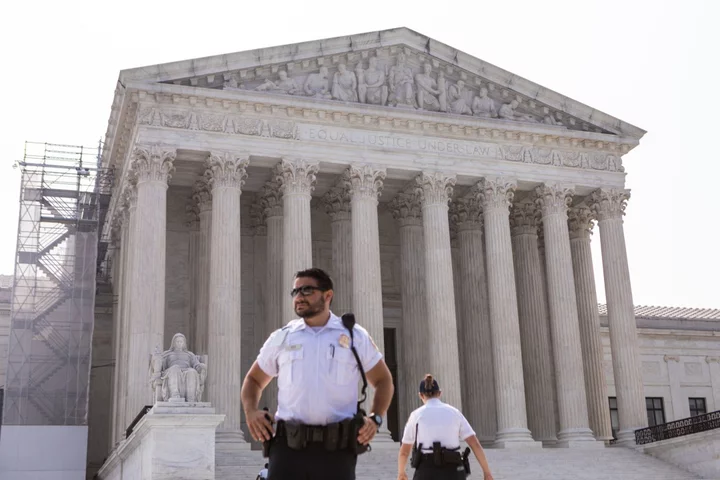The US Supreme Court signaled a reluctance to strike down the federal gun ban for people subject to domestic violence restraining orders.
Hearing arguments in Washington, several members of the court’s conservative majority suggested they didn’t read the Constitution’s Second Amendment as going so far as to protect the gun rights of people found to be dangerous.
“You don’t have any doubt that your client is a dangerous person, do you?” Chief Justice John Roberts asked the lawyer for Zackey Rahimi, the Texas man challenging the law. Prosecutors say Rahimi has a long history of violent behavior, much of it after a judge imposed a restraining order to protect a former girlfriend he was accused of attacking.
The case is the high court’s first test of a year-old ruling that strengthened Second Amendment protections and established a constitutional right to carry a handgun in public. That decision said gun laws can survive only if the government can show a history of similar, or at least analogous, restrictions.
At the same time, the court reiterated that some types of firearms restrictions are constitutional, leaving uncertainty about where exactly the legal line is.
Gun rights and gun violence are among the country’s most divisive and emotional issues. More than 36,000 people have died in the US as a result of shootings this year, according to Gun Violence Archives, which tracks firearm-related incidents. The argument took place 13 days after a gunman killed 18 people in a shooting spree in Lewiston, Maine.
‘Heartland’ Case
As supporters of gun restrictions demonstrated outside the court, the justices suggested on the inside that the case before them wasn’t all that difficult.
Justice Amy Coney Barrett, who like Roberts was in the 2022 majority, characterized domestic violence as a “heartland” example of a dangerous situation. She later said the woman who sought the protective order “did submit a sworn affidavit giving quite a lot of detail about the various threats.”
As a federal appeals court judge in 2019, Barrett wrote that legislatures have power to bar gun possession by people who are dangerous but not those who aren’t.
Another conservative, Justice Neil Gorsuch, stressed that Rahimi was aiming to invalidate the entire law rather than just arguing it couldn’t be constitutionally applied to him. Gorsuch pointed the high bar the court has established for that sort of challenges. “We have to ask: Is it unconstitutional in any application?” he said.
The 5th US Circuit Court of Appeals struck down the law, saying it lacked a historical analogue and was “an outlier that our ancestors never would have accepted.”
President Joe Biden’s administration contends Congress and the states can strip guns from people who aren’t “law-abiding, responsible citizens.” In his opinion for the majority last year, Justice Clarence Thomas repeatedly used those words to describe the people whose rights the court was protecting.
Although prosecutions under the 1994 law are relatively rare, it has been used to block more than 77,000 gun sales since 1998.
The case is United States v. Rahimi, 22-915.
(Updates with comments from Barrett, Gorsuch starting in eighth paragraph.)

